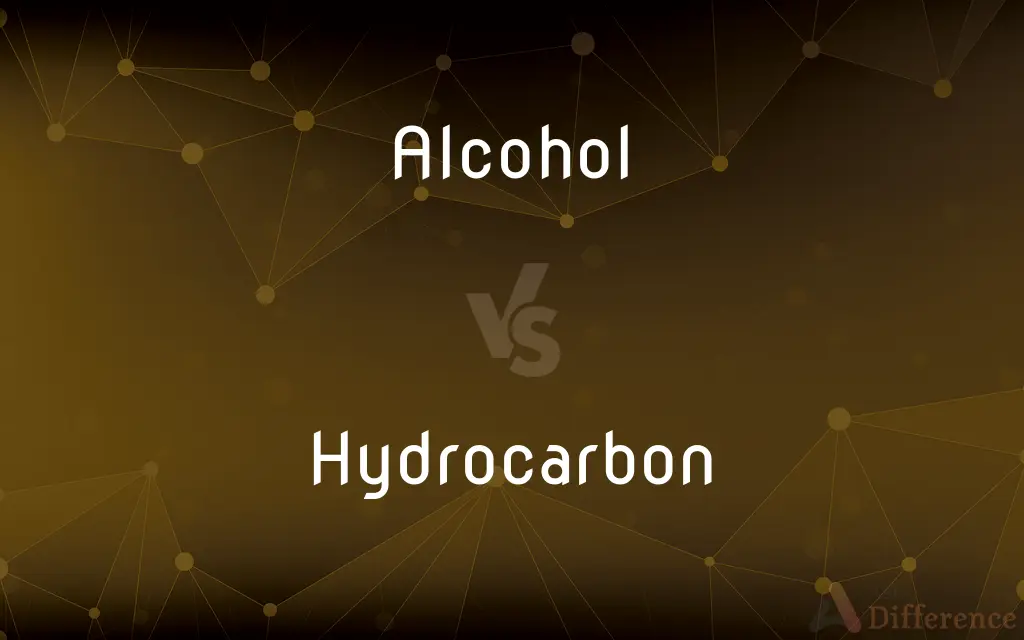Alcohol vs. Hydrocarbon — What's the Difference?
By Tayyaba Rehman & Urooj Arif — Updated on March 10, 2024
Alcohol contains a hydroxyl group attached to a carbon atom, making it polar and capable of hydrogen bonding, whereas hydrocarbons consist only of carbon and hydrogen, making them nonpolar and hydrophobic.

Difference Between Alcohol and Hydrocarbon
Table of Contents
ADVERTISEMENT
Key Differences
Alcohols are organic compounds characterized by the presence of one or more hydroxyl (-OH) groups attached to a carbon atom. These groups make alcohols polar, affecting their solubility in water and boiling points. Hydrocarbons, on the other hand, are composed solely of carbon and hydrogen atoms. Their molecular structure lacks polar bonds, which influences their physical and chemical properties differently from alcohols.
The polarity of alcohols allows them to engage in hydrogen bonding, an interaction that significantly raises their boiling points compared to hydrocarbons of similar molecular weight. Hydrocarbons, lacking polar bonds, cannot form hydrogen bonds, which generally results in lower boiling points for molecules of comparable size.
Alcohols can act as both solvents and reagents in a variety of chemical reactions due to their polar nature. They are soluble in water and can dissolve many ionic compounds. Hydrocarbons, being nonpolar, are insoluble in water but can dissolve in other nonpolar solvents, limiting their reactivity and solubility in aqueous environments.
In terms of reactivity, the hydroxyl group in alcohols makes them reactive towards acids and bases, enabling them to participate in esterification and dehydration reactions. Hydrocarbons, with their nonpolar bonds, exhibit a different set of reactions, primarily undergoing combustion and substitution reactions.
The application spectrum of alcohols extends from being used as solvents, antiseptics, and fuels (e.g., ethanol) to participating in the synthesis of various chemicals and pharmaceuticals. Hydrocarbons are predominantly used as fuels (e.g., methane, propane), in the manufacture of plastics, and as solvents in the industrial sector.
ADVERTISEMENT
Comparison Chart
Composition
Carbon, hydrogen, and oxygen (due to the hydroxyl group)
Carbon and hydrogen only
Polarity
Polar due to the hydroxyl group
Nonpolar
Boiling Point
Generally higher due to hydrogen bonding
Generally lower due to lack of hydrogen bonding
Solubility in Water
Soluble, varying with the chain length and structure
Insoluble or less soluble
Chemical Reactions
Esterification, dehydration
Combustion, substitution
Compare with Definitions
Alcohol
A compound with a hydroxyl group attached to a saturated carbon atom.
Ethanol is used in beverages and as a solvent.
Hydrocarbon
An organic compound consisting entirely of hydrogen and carbon.
Methane is a primary component of natural gas.
Alcohol
Can undergo oxidation to form aldehydes or ketones.
Ethanol can be oxidized to acetaldehyde.
Hydrocarbon
Used as a base for various fuels.
Octane is a component of gasoline.
Alcohol
Serves as a fuel or fuel additive in some applications.
Ethanol is blended with gasoline to reduce emissions.
Hydrocarbon
Subject to combustion reactions that release energy.
Butane is used as a fuel in lighters.
Alcohol
Used as a disinfectant due to its ability to destroy bacteria and viruses.
Isopropyl alcohol is commonly used for sanitizing surfaces.
Hydrocarbon
Hydrocarbons are major contributors to greenhouse gas emissions.
Burning propane releases carbon dioxide.
Alcohol
Acts as a solvent in the pharmaceutical industry.
Methanol is used in the manufacture of many pharmaceuticals.
Hydrocarbon
Can form polymers, the basis of plastics.
Ethylene is polymerized to form polyethylene.
Alcohol
In chemistry, alcohol is an organic compound that carries at least one hydroxyl functional group (−OH) bound to a saturated carbon atom. The term alcohol originally referred to the primary alcohol ethanol (ethyl alcohol), which is used as a drug and is the main alcohol present in alcoholic drinks.
Hydrocarbon
In organic chemistry, a hydrocarbon is an organic compound consisting entirely of hydrogen and carbon. Hydrocarbons are examples of group 14 hydrides.
Alcohol
Any of a series of hydroxyl compounds, the simplest of which are derived from saturated hydrocarbons, have the general formula CnH2n+1OH, and include ethanol and methanol.
Hydrocarbon
Any of numerous organic compounds, such as benzene and methane, that contain only carbon and hydrogen.
Alcohol
A colorless volatile flammable liquid, C2H5OH, synthesized or obtained by fermentation of sugars and starches and widely used, either pure or denatured, as a solvent and in drugs, cleaning solutions, explosives, and intoxicating beverages. Also called ethanol, ethyl alcohol, grain alcohol.
Hydrocarbon
(organic compound) A compound consisting only of carbon and hydrogen atoms. Category:en:Carbon
Alcohol
Intoxicating beverages containing ethanol considered as a group
The national consumption of alcohol.
Hydrocarbon
A compound containing only hydrogen and carbon, as methane, benzene, etc.; also, by extension, any of their derivatives.
Alcohol
Any of a class of organic compounds (such as ethanol) containing a hydroxyl functional group (-OH).
Hydrocarbon
An organic compound containing only carbon and hydrogen
Alcohol
(colloquial) Ethanol.
Alcohol
(uncountable) Beverages containing ethanol, collectively.
Alcohol
(obsolete) Any very fine powder.
Alcohol
An impalpable powder.
Alcohol
The fluid essence or pure spirit obtained by distillation.
Alcohol
Pure spirit of wine; pure or highly rectified spirit (called also ethyl alcohol or ethanol, CH3.CH2.OH); the spirituous or intoxicating element of fermented or distilled liquors, or more loosely a liquid containing it in considerable quantity. It is extracted by simple distillation from various vegetable juices and infusions of a saccharine nature, which have undergone vinous fermentation.
Alcohol
A class of compounds analogous to vinic alcohol in constitution. Chemically speaking, they are hydroxides of certain organic radicals; as, the radical ethyl forms common or ethyl alcohol (C2H5.OH); methyl forms methyl alcohol (CH3.OH) or wood spirit; amyl forms amyl alcohol (C5H11.OH) or fusel oil, etc.
Alcohol
A liquor or brew containing alcohol as the active agent;
Alcohol (or drink) ruined him
Alcohol
Any of a series of volatile hydroxyl compounds that are made from hydrocarbons by distillation
Common Curiosities
Why are hydrocarbons insoluble in water?
Hydrocarbons are insoluble in water due to their nonpolar nature, which does not allow them to form hydrogen bonds with water molecules.
Can alcohols and hydrocarbons mix?
Alcohols and hydrocarbons can mix in certain conditions due to alcohols' unique property of being miscible with both polar and nonpolar substances.
Are all hydrocarbons flammable?
Most hydrocarbons are flammable, especially those with lower molecular weights, as they are major components of fuels.
Can alcohols be used as fuels?
Yes, some alcohols, like ethanol, are used as fuels or fuel additives.
What reaction is typical for alcohols but not for hydrocarbons?
Esterification is typical for alcohols, where they react with acids to form esters, a reaction not common for hydrocarbons.
What makes alcohols polar?
Alcohols are polar because of the electronegative oxygen atom in the hydroxyl group, which creates a dipole moment.
Is ethanol soluble in water?
Yes, ethanol is soluble in water, making it useful in various applications.
How do the boiling points of alcohols and hydrocarbons compare?
Alcohols generally have higher boiling points than hydrocarbons of similar molecular weight due to hydrogen bonding.
Can hydrocarbons undergo addition reactions?
Yes, unsaturated hydrocarbons like alkenes and alkynes can undergo addition reactions.
What is a common use of hydrocarbons in everyday life?
Hydrocarbons are commonly used as fuels, such as in gasoline for cars and propane for grilling.
What environmental impact do hydrocarbons have?
Hydrocarbons can contribute to air pollution and greenhouse gas emissions when burned.
What types of hydrocarbons exist?
Hydrocarbons can be classified into alkanes, alkenes, alkynes, and aromatic hydrocarbons, based on their bonding.
Why are alcohols considered good solvents?
Alcohols are considered good solvents due to their ability to dissolve both polar and nonpolar substances.
What is the role of hydrocarbons in the plastic industry?
Hydrocarbons serve as the raw materials for the synthesis of polymers, which are the basis of plastics.
Share Your Discovery

Previous Comparison
Humus vs. Hummus
Next Comparison
Interpretative vs. InterpretiveAuthor Spotlight
Written by
Tayyaba RehmanTayyaba Rehman is a distinguished writer, currently serving as a primary contributor to askdifference.com. As a researcher in semantics and etymology, Tayyaba's passion for the complexity of languages and their distinctions has found a perfect home on the platform. Tayyaba delves into the intricacies of language, distinguishing between commonly confused words and phrases, thereby providing clarity for readers worldwide.
Co-written by
Urooj ArifUrooj is a skilled content writer at Ask Difference, known for her exceptional ability to simplify complex topics into engaging and informative content. With a passion for research and a flair for clear, concise writing, she consistently delivers articles that resonate with our diverse audience.
















































